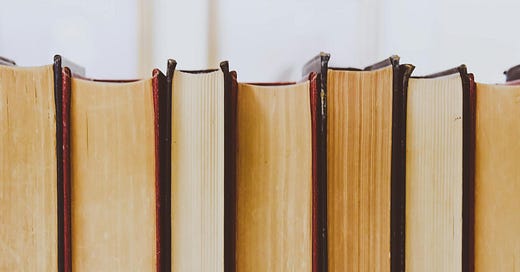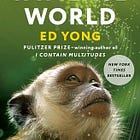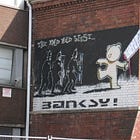Best Books of 2023 (for people who had a rough year)
Books about hope, about seeing things differently, about going easier on yourself, and about coping with a difficult present.
Editor’s Note: All of the books on this list are affiliate linked to Bookshop.org. If you buy through the link, I get a small kickback, which would be a lovely Christmas gift if you’ve been enjoying my work! The fact that I get paid does not influence my choices.
2023 was a hard one for me! I quit a job to start a new writing business in a year where most pundits seemed to agree that writing was over because of AI. I had to manage the ongoing mental health fallout from COVID, I had to try and do a not-terrible job raising my two kids, and I had to face some pretty rough truths about myself and my past. My understanding, just talking to friends and family, is that everyone seems to be at some stage of mental health crisis, so it’s nice, at least, to know I haven’t been alone.
The really good news was that in spite of how hard this year was, I began to start building a decent-sized community here at Better Strangers, thanks to all of you here at Substack and on TikTok. My bread and butter with this project has been books — I’ve focused on interesting ideas, brilliant stories, insightful visions of the future, and strange ways of seeing things that have helped me pull through one of the rougher times in my life. It feels like all of you — and the list of books that follow — have made a better future seem possible after all this difficulty and sadness.
I’d like to thank you all for that — I’ve got some really exciting stuff planned for next year, and I hope you’ll stick around. In the meantime, if you or someone you know had a rough year too, here are the books that helped me get through mine.
Book of the Year
Our Share of Night by Mariana Enriquez
For parents who are scared for their kids
Mariana Enriquez’s Our Share of Night is the best book of the year in large part because it spoke to something that has been worrying me for the entirety of my children’s lives: namely, their future, and what this world might do to them. That anxiety did not get easier as the year went on, as climate change worsened, as the former President continued to remain a contender for future president, and as a US-backed government began to wage a brutal genocidal war that has disproportionately killed innocent children.
Our Share of Night is not set in our time or place, but during Argentina’s brutal (also US-backed) “Dirty War” in which thousands were tortured and “disappeared” in the 70s and 80s. The main character is Juan, a medium who is under the brutal control of a powerful supernatural Order. Juan’s son, Gaspar, may have some of his fathers powers, and as such is a target of the Order. Juan wants to take steps to protect him.
While the book is objectively great horror, what makes it most effective is in showing how, to a child, what a parent means as protection can look a lot like abuse and cruelty. It’s a powerful statement on intergenerational trauma, how love can turn into hate, and how totalitarian governments are only marginally less scary than the eldritch forces that hunger for us just beyond the veil of our reality.
Nonfiction
The Body Keeps the Score by Bessel van der Kolk
For people who want to heal
Bessel van der Kolk’s The Body Keeps the Score serves as a weirdly good chaser to Our Share of Night. It is a handbook explaining the new science of how trauma and abuse can warp our minds and bodies, and the even newer science of how people can recover.
Van der Kolk is one of the nation’s leading experts in the psychiatry of trauma, and to make a very fascinating book extremely short, he explains how after emotional, physical, and sexual abuse and trauma, our bodies activate mechanisms that are designed to protect us, but which have side effects like depression, anxiety, and PTSD.
The therapies that appear to be having a major impact on recovery from trauma are diverse and wide ranging: they include yoga, taking courses in drama, psychedelic therapies, and much more. If you want to get better, this is the book to start with.
An Immense World by Ed Yong
For people who need more wonder in their lives
The book that most shifted my worldview was Ed Yong’s spectacular An Immense World. It is a study of how animals’ sensory experience of the world makes their worldview (or umwelt, as scientists call it) fundamentally different to our own.
Some of them can see colors we can’t, they can smell things we’d never imagine, they can hear better and with more complexity than we ever could, and some of the smallest — certain bats — can make sounds that are as loud as our jet engines (but which they mercifully make at frequencies beyond our hearing).
If your life needs more wonder and awe in it, this is your book.
Emergent Strategy by adrienne maree brown
For people who want to be the change
One of the most interesting “ideas” books I’ve read in recent years is Octavia Butler’s Parable of the Sower. At the core of the novel is a religion Butler invented called Earthseed, which pushes the compelling concept of God as change. From Parable of the Sower:
All that you touch
You Change.
All that you Change
Changes you.
The only lasting truth
is Change.
God
is Change.
Emergent Strategy takes Earthseed — which, ultimately, is just one element in Butler’s novel — and expands on its ideas, providing the beginnings of a philosophy that could help us map and influence the chaos of our times. The author, adrienne maree brown, is a renowned activist and facilitator, heavily involved in left-wing causes, and a true believer in the “be the change you wish to see in the world” approach to living.
Stolen Focus by Johann Hari
For people who are exhausted by modern life
Modern technology has reduced our attention spans to an almost incapacitating extent. Constantly being online is a major contributor to the anxiety, depression, and overall mental health epidemics that we are facing. It is keeping us from engaging more meaningfully with the people around us, it’s giving our kids ADHD, and it’s ruining our ability to engage with the world in meaningful ways.
Johann Hari’s Stolen Focus is an extremely compelling look into how this loss of our collective attention came to be, what feeds into it, and how we can begin to go about solving it. Hari’s got some slightly messianic tendencies — he hasn’t always behaved the most ethically — but this is a great book in spite of his personal flaws, and is vital to anyone who wants to fight the attention capture machine.
The Art of Not Being Governed by James C. Scott
For people who want tips on escaping society and moving to the mountains
There is a mountainous region in Asia known as Zomia that is nearly the size of Europe. In this region, for centuries, the “hill people” that live there have managed to avoid becoming incorporated into the totalitarian states that sprung up in the valleys beneath them.
In The Art of Not Being Governed, renowned anthropologist James C. Scott investigates how the many tribes of “hill people” managed to keep the state at arms length for so long, and the results are absolutely fascinating.
We are living in the first time in human history where it’s more or less impossible to avoid living under some form of government, but Scott gives us tips on what freedom truly looks like, and how communities can learn to be resilient in the face of oppressive power.
Braiding Sweetgrass by Robin Wall Kimmerer
For people who want to heal the world
When ecologist Robin Wall Kimmerer first went to learn about botany in school, her professor mocked her for asking questions about why certain flowers looked so beautiful together. That was not, her professor informed her, what science was about.
Kimmerer, a member of the Potawatomi tribe, grew up in the woods of upstate New York, and connected to plants not only through science, but through the stories her family would tell her about the earth. As she grew into an acclaimed ecologist, she realized that, contrary to what her professor had told her, things like myth and beauty are vital to understanding the science of complex systems. She now incorporates these stories into her teachings about botany, biology, and ecology.
For anyone looking for an alternative to the predominant capitalist worldview that the earth is here for our exploitation and destruction, Robin Wall Kimmerer’s astounding Braiding Sweetgrass should be book number one. It is so full of ideas that I could write 700 articles about her philosophy, and to be honest, I just might.
How to Change Your Mind by Michael Pollan
For psychonauts
Michael Pollan’s How to Change Your Mind is a catalogue of the recent scientific progress made in the field of psychedelic therapy. The science is frankly astounding — the extent to which psilocybin, LSD, ayahuasca, ketamine, and other psychotropics can, when employed properly, help people struggling with depression, anxiety, PTSD, and impending doom is frankly breathtaking, and it’s exciting to realize that we may be on the brink of a major psychological revolution.
The book has its flaws — as my friend
put it on her Goodreads review, “Do I want that much information about old white men tripping?” — so if you, like basically every other person on earth, can’t stand hearing another person describe their trips, then there are parts of the book worth skipping. But the science is cool.Best Fiction
No One is Talking About This by Patricia Lockwood
For people who spend too much time on the internet
Patricia Lockwood’s No One is Talking About This is the funniest book I’ve read in years. It also happens to be very good, which is not a guarantee for Very Funny books. It is a perfect read for anyone who has let vast chunks of their lives be absorbed by the internet.
I do not want to describe much of the plot, it is best experienced going in blind, but I will drop in a quote from the book that will give you a sense of whether you’d like the book or not. This quote is on the third page, so there are no spoilers here.
What had the beautiful thought been, the bright profundity she had roused herself to write down? She opened her notebook with the sense of anticipation she always felt on such occasions — perhaps this would finally be it, the one they would chisel on her gravestone. It read:
chuck e cheese can munch a hole in my you-know-what
A Psalm for the Wild-Built and A Prayer for the Crown-Shy by Becky Chambers
For people who need to go easier on themselves
I talk a lot about utopias both on this newsletter and on TikTok, and the main complaint that I hear is that utopias are “boring” because there’s no conflict in a perfect world.
These two short books — together, the Monk and Robot duology — are my answer to that. The books imagine a society where humanity decided to stop destroying the planet and instead sought sustainability and harmony. It’s also a book where the conflicts seem pretty low stakes — the main characters need a break, or are too hard on themselves.
If that sounds boring, it’s not: these are absolutely entrancing reads, you can finish each of them on a rainy weekend afternoon with a cup of tea. They have important things to say about what a sustainable future could look like, while also reading like a cozy hug from a good friend. It is proof that even low-conflict utopias are enthralling in the hands of a talented writer.
Ducks by Kate Beaton
For people trying to make art in the age of late capitalism
Kate Beaton made a name for herself as the artist behind the delightfully whimsical Hark! A Vagrant. But like most of us in the creative fields, she graduated with student loan debt that her prospective career in art was likely to ever pay down.
So Beaton decided to tough it out for two years making big money in Alberta’s oil sands. Ducks chronicles her times in Alberta, and the impact it had on her mental and physical health. It is sometimes a tough read — Beaton was sexually harassed more or less constantly and was assaulted twice — but it will ring familiar to any Millennial or Zoomer who has made the choice to sell a bit of themselves to the capitalists in order to earn at least some financial security.
Infinite Detail by Tim Maughan
For people who want to burn it all down and start something new
Every radical I know has an impulse to burn everything to the goddamn ground and start anew. Some keep this impulse in check better than others, but the temptation is always there.
Tim Maughan’s excellent Infinite Detail looks at what would happen if we did burn it all to the ground (spoiler: it would be bad!). But he also examines how radicals and artists can start to build a better future right in the middle of a violent and oppressive present.







